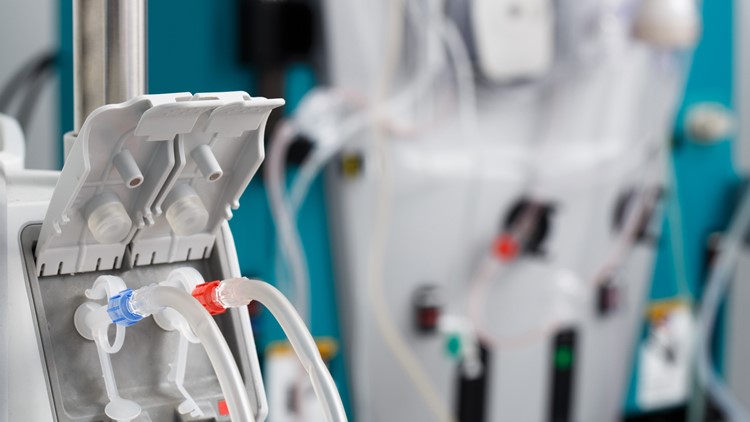CHARLOTTE, N.C. — At a time when America is divided by immigration, hospitals across the country are putting nationality aside in the name of medicine. The result? Some non-U.S. citizens are getting life-saving organ transplants.
Since 2012, 34 people listed as non-citizens living in this country received kidneys, livers and hearts at Carolinas Medical Center, according to United Network for Organ Sharing records. During that time, CMC performed 1,399 transplants for those organs, according to UNOS.
Atrium Health Deputy Chief Physician Executive Dr. Scott Rissmiller said CMC's growing transplant center in this growing region follows every rule and doesn't discriminate. Atrium Health said the health system is proud of the fact it doesn't turn anyone away and saves lives by transplanting organs in the patients who need them the most, without regard to immigration status.
"Our mission is for all. It's in our DNA," Dr. Rissmiller said. "We are going to celebrate any opportunity that we have to be able to help improve someone's life."
At the beginning of 2019, seven percent of the 111,000 thousand people on American wait lists for heart, liver, and kidney transplants were non-U.S. citizens, according to UNOS records. That’s nearly 8,000 people.
In the last 30 years, more than 7,800 non-U.S. citizens received organs out of over 677,000 transplants, according to UNOS. According to NBC Charlotte's analysis of those records, CMC, Charlotte's only transplant center, performed more of those non-U.S. citizen transplants than any other in the Carolinas since 2012 with 34 out of 1,399 total transplants-- more than two percent. That's the equivalent of almost five people every year who came to CMC for life-saving surgery.
CMC is one of eight transplant centers North Carolina and South Carolina and one of just four in those two states that transplants hearts, livers and kidneys.
CMC is certainly not alone. Some of the country's largest hospitals perform transplants on people who live in this country but aren't technically citizens. Some hospitals perform more than CMC, and some perform less.
UNOS made changes in recent years in an effort to be more transparent about who is receiving transplants. That's how we obtained a breakdown by citizenship status of every transplant at every hospital over the last 20 years.
Dr. Gabriel Danovitch is the medical director of UCLA's Kidney and Pancreas Transplant Program and former chairman of UNOS' international committee. He said non-citizens who live here, whether they're undocumented, documented, have a Green Card or long-term visa, donate organs, and he believes if you can give life, you should receive life.
"In medicine, we're not interested in anyone's legal status; that's not my job," Dr. Danovitch said. "We know that so-called undocumented residents of this country are organ donors. If you live in a country, and you can be a donor, you ought to be able to be a recipient in that same country."
Advocates agree.
"This is about human beings," Action NC Immigrant Justice Director Hector Vaca said. "Why wouldn't somebody get a transplant if they need it? If they've been in a car accident or they're dying, they've got liver problems, that's what the system's for is to help people in need."
Because there are not enough donated organs to help every person in need, the Organ Procurement and Transplantation Network (OPTN) balances factors when deciding who gets a transplant. Organs are given to patients, not based on citizenship, but instead on fair consideration of candidates' circumstances and medical needs, also known as "justice" -- according to OPTN. In addition, the federal government considers an effort to increase the number of transplants performed and length of time patients and organs survive.
Each organ has specific factors that go into allocation as well. For example, consideration is given to wait time, immune system incompatibility, whether the patient's a child or prior living donor, proximity to donor hospital, and survival benefit for kidneys, according to UNOS. For livers and hearts, consideration is given to medical urgency, proximity to donor hospital, and whether the patient is a child, according to UNOS.
The bottom line. It all comes down to medical need.
UNOS records show non-citizens' heart, kidney, and liver donations accounted for at least 2.7 percent of all organ donations in 2018 with another 6 percent of the data still unknown. Non-citizens received 5.2 percent of all transplants for those organs in 2018, according to UNOS data.
U.S. citizen Andy Auman was previously on a waitlist for a kidney transplant and didn't know non-citizens, in some cases, received transplants before him because of their dire medical situation and individual circumstances.
"That was information that they did not give us," he said.
These days, all Auman cares about is the fact he now has his kidney. He received his transplant in 2018.
There are even rarer cases when non-citizens who don't actually live in the United States travel here to get heart, kidney and liver transplants. According to UNOS, that occurred 982 times over the last 30 years.
"If organs are being allocated to people who don't live here, are not residents here, I think the general public should be aware of that and comment accordingly," Dr. Danovitch said.



